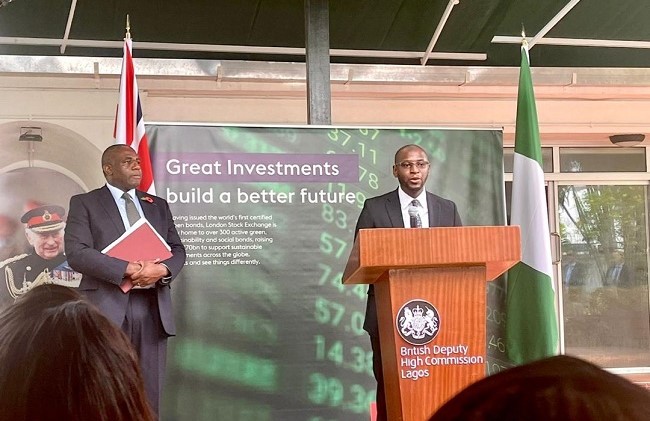UK Foreign Secretary, David Lammy, on Monday, November 4, 2024, launched a landmark report at a growth and renewable energy reception in Lagos on the opportunities for Africa in the global battery value chain.

The report, titled “From Minerals to Manufacturing: Africa’s Competitiveness in Global Battery Supply Chains”, was undertaken through the UK’s Manufacturing Africa programme in partnership with the UK’s flagship research organisation on batteries and energy storage, the Faraday Institution, and reveals cost-competitive investment opportunities in the battery supply chain in Africa.
Key findings indicate that, with the right investment and policy environment, refining locally extracted lithium, nickel, manganese and copper in Africa could be up to 40% more competitive than the rest of the world by 2030. With just one high-quality refinery for each of these minerals, Africa could generate an additional $6.8 billion in annual revenues and create approximately 3,500 good quality jobs operating in the battery supply chain.
Beyond mineral refining, initial analysis suggests that countries like Tanzania and Morocco could produce batteries that are cost-competitive with Europe under certain conditions. For example, Morocco could achieve production costs of $72/kWh and Tanzania at $68/kWh, compared to $68/kWh in Europe, where production benefits from subsidies.
The report also estimates battery demand, identifies additional opportunities in battery packs and in battery assembly and recycling, maps where companies are operating in battery value chains across Africa and provides recommendations for policymakers and investors on how to advance these initiatives.
This report follows the Foreign Secretary’s speech at Kew Gardens on September 17, 2024, where he announced his intention to work with partners to create a Global Clean Power Alliance.
At the event in Lagos, the Foreign Secretary met with investors, development partners and companies in the clean energy sector, including UK smart-meter firm SteamaCo, and UK e-waste firm Hinckley Recycling, with whom he assembled a second life battery. Both firms are invested in Nigeria.
Director for Economic Development and Partnerships at the UK Foreign Commonwealth and Development Office, Helen King, said: “This report shows that investors should give serious consideration to Africa’s potential as a future manufacturer of batteries, not just a buyer. The UK Government has a clear mission to support global growth that is inclusive of people and planet, and this sector presents real opportunity for African growth and jobs. We look forward to engaging with policy makers and investors on taking forward the outcomes of this report and doing the hard work to realise the opportunity it represents.”
The Managing Director of Nigeria’s Sovereign Investment Authority, Aminu Umar-Saqid, said: “With Nigeria’s growing demand for electricity, bridging the gap between the traditional energy infrastructure and renewable energy solutions, enhanced by energy storage, is as vital as localising the supply chain. The NSIA, through its subsidiary – RIPLE – is piloting the development of an integrated battery manufacturing facility to bolster Nigeria’s industrial base and support the nation’s Energy Transition Plan. This report, sponsored by the FCDO under its Manufacturing Africa Programme has been instrumental in calibrating our strategy thus providing a solid base for the development of our initiative.”
The CEO for the Faraday Institution, Professor Martin Freer, said: “Given the abundance of critical natural minerals in Africa, African nations could play a significant role in the global battery supply chain if they could overcome investment, infrastructure and workforce challenges. The report contains a wealth of information and analysis on the subject that will be valuable to a variety of stakeholders including potential investors in projects in other parts of the battery value chain beyond mining.”
Manufacturing Africa Programme Nigeria Country Lead, Kemi Onabanjo, said: “This report shows that investment in battery manufacturing in Africa can be a win-win, creating jobs and growth locally while driving down production costs and supporting global climate goals. Translating Africa’s abundance of critical mineral wealth into jobs and growth means African economies capturing a greater share of the manufacturing process once minerals are out of the ground. The UK-Aid funded Manufacturing Africa project does exactly this, and we have already mobilised £1.2 billion in FDI for local manufacturing and created 95,000 jobs across the continent through similar support.”

Your blog is a constant source of inspiration for me. Your passion for your subject matter is palpable, and it’s clear that you pour your heart and soul into every post. Keep up the incredible work!